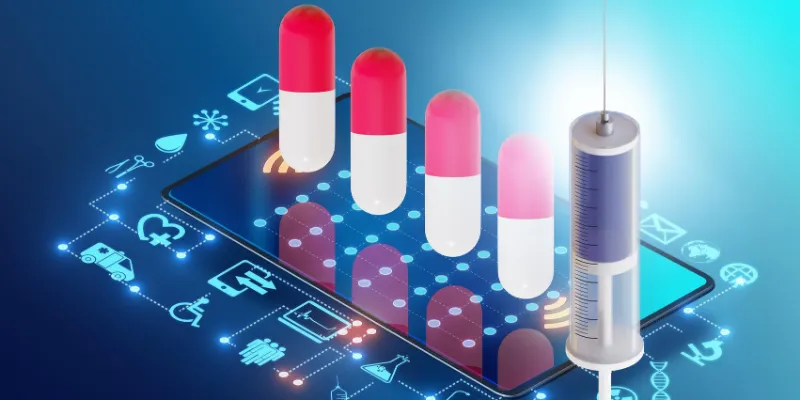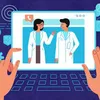How healthtech companies are ramping up and adopting new technologies to capture the mHealth market
The spate of innovative solutions in the healthtech space combined with the widespread penetration of mobile communications has proved to be a shot in the arm for the mHealth sector, making quality diagnostic and treatment available to the masses.

With the rising demand for home-based remote healthcare services, the global mHealth market is projected to witness exponential growth.
According to Fortune Business Insights for the forecast period 2019-2026, the value of the global mHealth market is likely to reach US$ 293.29 billion by the end of 2026 from US$ 34.28 billion in 2018, growing at a CAGR of 29.1%.
mHealth has made it easier to avail healthcare services from any corner of the world and also maintain the healthcare supply chain management.
As epidemics and a shortage of healthcare workers continue to impact the healthcare system and governance in many parts of the world, the growth of telemedicine offers new hope for the promotion of quality, accessible and affordable healthcare.
Scope to improve healthcare facility
With an increasing number of people who have access to reliable technology, mobile communications can now unlock their potential to radically improve healthcare services even in the most remote and resource-poor environments.
Though mHealth is still in its early stages, it is already on the path to dramatically transforming health delivery. This is because of some concrete benefits that it demonstrates -- improved ability to diagnose; track and treat diseases; increased access and affordability of healthcare services, particularly for hard-to-reach populations; actionable public health information and increased access to medical education and training for health workers.
Poor healthcare and the challenges associated with it present arguably the most significant barrier to sustainable global development. While epidemics and the lack of adequate preventive care continue to take a significant toll on economies, the ability to overcome serious health challenges is hindered by systemic obstacles, including a global shortage of healthcare workers.
This is further intensifying the already existing pressure on developing countries who are not only grappling to control extreme poverty, but are also burdened with the growing incidence of chronic diseases.
The mHealth market is remarkably dynamic with a wide range of applications -- education and awareness, remote monitoring, disease and epidemic outbreak tracking, training for healthcare workers and diagnostic/treatment support, among many others.
The growing penetration of mobile phone networks and affordable data packs globally has become a central element in the promise of mobile technologies for health.
The increasing competition in mHealth market
The increasing popularity of mHealth solutions is driving interest from healthtech companies, pharmaceutical companies, healthcare providers, and patients. This results in healthtech companies facing potential new competition in the mHealth market who are now ramping up and adopting advanced technologies. There are three types of established companies and new entrants in the mHealth sector -- consumer technology, business-to-business technology and pharmaceuticals.
These companies, especially new entrants, bring unique strengths and capabilities and also represent potential opportunities for established healthtech companies to foster ecosystem alliances and accelerate efforts to deliver value-added mHealth solutions and gain traction within traditional and new reimbursement structures.
Telehealth companies adopting innovative technologies
The mHealth sector has a lot to offer and healthtech companies are exploring its potential by adopting advanced technologies. By promoting remote patient monitoring, introducing IoT-enabled devices, promoting telemedicine and imparting education to patients about chronic diseases, these companies are leveraging technology to revolutionise the global healthcare system.
With the increasing proliferation of smartphones and access to affordable data packs, remote patient monitoring (RPM) has become possible and effective.
The use of technologies that track and transmit a user’s vital signs and convey real-time insights to providers helps them determine the next steps. This is not only transforming provider-patient relationship, but also enabling the loved ones to stay in touch with the patient's healthcare routine no matter where is one located.
Further, healthtech companies are introducing apps for steady management of chronic diseases such as diabetes, heart disease, asthma, etc. which need continuous evaluation and monitoring.
Telemedicine has witnessed an exponential growth since the coronavirus outbreak as it bought the majority of doctors on videoconferencing platforms. It is helping bridge the healthcare gap between rural India and urban India by bringing access to specialist doctors in rural areas where access to medical facilities and specialist's opinion is limited.
What is believed to be the perfect solution to healthcare challenges in the country, telemedicine is expected to bring great relief to its developing medical infrastructure.
Key mHealth capabilities
Healthtech companies are focusing on specific capabilities that are translating into key success factors in the consumer mHealth market. These capabilities are:
- Complete product and service development cycle
- Economic value and customer impact
- Consumer marketing, onboarding and engagement
- Regulatory affairs and quality
- mHealth alignment and culture
Healthtech companies that want to gain a competitive advantage in the mHealth space will need to understand the quickly emerging market landscape where competitors have an edge with rapid development cycles, focused initiatives, and consumer-oriented software and solutions.
Today’s innovation likely to impact healthcare tomorrow
Digital health technologies such as innovative digital sensors, middleware and digital imaging are dramatically transforming health and medicine in addition to giving patients more control over their own health.
For instance, automation using AI algorithms for image analysis can act as key productivity gaining and time-saving contributors for radiologists. Moreover, it can help improve diagnostic accuracy and early detection of disease conditions, thereby resulting in improved patient outcomes in the long run.
Many startups are already active in the space of artificial intelligence for radiology, and more incumbents are developing solutions across different conditions.
Further, wearable tech products with sophisticated algorithms are enabling patients to take a more active role in managing their health and medical care. mHealth can also assist patients in managing chronic health conditions such as asthma, diabetes, hypertension, and HIV/AIDS.
Summing it all up
The mHealth sector offers tremendous opportunities for players across various sectors, from governments to NGOs to businesses. With a strategic approach, each of these players can contribute to improved health outcomes on a massive scale.
The mHealth industry is at an inflection point. With many projects being implemented and healthtech companies rapidly driving innovations, it is a given that investment in the sector will continue and it will serve an ever wider range of constituents in the years ahead.
Moreover, technological advancements are expected to bring enhanced benefits, particularly in the areas of patient monitoring, data collection, remote diagnostic and treatment.
With mHealth continuing to provide demonstrable impacts and reiterating that mobile technology improves the efficiency of healthcare delivery, the next evolutionary stage in the field is to expand the scope and scale of operations.
(Disclaimer: The views and opinions expressed in this article are those of the author and do not necessarily reflect the views of YourStory.)









